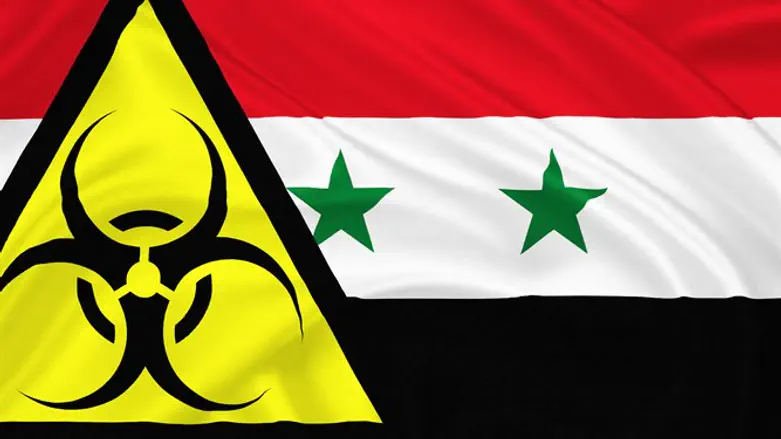
President Trump, British Prime Minister Theresa May and French President Emmanuel Macron were right to uphold the global ban on the use of chemical weapons and respond militarily to the April 7 gas attack on opposition forces in Douma, Syria. Yet, more needs to be done.
The April 14 US-UK-French air operations against Syrian storage, military and research targets, while a welcome development, must be followed by further punishing responses - - among them, eliminating the Syrian regime’s ability to conduct future chemical weapons attacks by destroying its air force.
It is no secret that there is little consensus in Washington on an overall policy concerning Syria’s civil war. Up to now it has consisted of periodic attempts to check Russian and Iranian influence, defeat ISIS and efforts to stabilizing the chaos that has engulfed the country since 2011.
Some have argued that President Trump’s March 29 statement that the U.S. will end its military presence in Syria “very soon” was unfortunate in that it emboldened Assad (as well as Moscow and Tehran) to do whatever he liked in his prosecution of the war without the check of U.S. power in his country.
Regardless of his recent misguided statement and of the lack of a coherent U.S. Syria policy, Mr. Trump is right in his stated inclination to respond aggressively to Assad’s latest use of chemical weapons.
The world has now seen Assad use chemical weapons against his own people on multiple occasions. Some estimates have the regime as responsible for conducting over 200 chemical weapons attacks with the latest being the April 7 attack in Douma.
President Obama’s failure to respond to Assad’s initial attack in 2013 and then-Secretary of State John Kerry’s flawed deal to have Russia remove from Syria 1,300 metric tons of weapons grade chemicals and stockpiles did little to prevent subsequent poison gas attacks.
It bears saying that President Trump’s launching of 59 Tomahawk cruise missiles at the Assad regime in response to the April, 2017 chemical weapons attack in Northern Syria also had a limited deterrence on the regime.
Taking out Syria's air force - - in particular the helicopters that are delivering many of these chemical weapons - - is a necessary step that Mr. Trump and his new National Security Advisor, John Bolton, need to put in motion. These past U.S. failures to deter Assad from using chemical weapons indicate a need for a more dramatic, punitive retaliation that degrades the Syrian regime’s ability to stage these war crimes.
These past U.S. failures to deter Assad from using chemical weapons indicate a need for a more dramatic, punitive retaliation that degrades the Syrian regime’s ability to stage these war crimes.
Taking out Syria's air force - - in particular the helicopters that are delivering many of these chemical weapons - - is a necessary step that Mr. Trump and his new National Security Advisor, John Bolton, need to put in motion.
Any such operation on this scale in Syria today will entail Russian and Iranian involvement. Russian and Iranian personnel will be killed amid U.S.-led operations targeting Syrian installations and aircraft, bringing risks of a wider conflict.
While some authorities have argued that Putin would refrain from taking on U.S. aircraft amid such an American response, regardless, an endeavor of this complexity and magnitude brings with it the likelihood of American and allied casualties.
These risks will require deft U.S. diplomacy and communication with Moscow and U.S. allies to prevent the operations from spiraling out of control.
However, a failure to destroy Syrian air power will ensure that Assad maintains the capacity for future chemical weapons attacks against his own people as well as U.S. allies, such as Israel and Sunni Gulf Arab states.
In order to make a difference and prevent future chemical weapons atrocities, the U.S. and its allies need not expand their mission beyond destroying Syrian air capabilities. As it stands, Mr. Trump’s known aversion to entrenched conflicts in the Middle East as well as current American public opinion would not support anything beyond a limited campaign in Syria.
Yet, within these constraints, Washington and its allies can make a substantive contribution towards stopping the use of poison gas in this seven-year humanitarian nightmare that has destroyed Syria.
These actions will save lives in Syria and the broader Middle East. Neighboring states, Israel included, understand that they are targets of future Syrian aggression. Ridding the Assad regime of the ability to deliver chemical weapons is a step towards safeguarding their populations from attacks of the likes that befell Douma.
Stopping Assad’s ability to use poison gas will contribute to regional security and support the principle that chemical weapons cannot be accepted as a form of combat due to their indiscriminate nature. It will also send a signal that the use of chlorine gas, despite not constituting a banned weapon under international law, must not be tolerated.
Trump, May and Macron have appropriately taken first steps against the Syrian state’s April 7 war crimes. Now’s the time to make this an even more painful lesson to Assad and others that chemical weapons must not be used as a tool of warfare.
Ted Gover, Ph.D., is instructor of political science at Central Texas College, USMC Camp Pendleton.